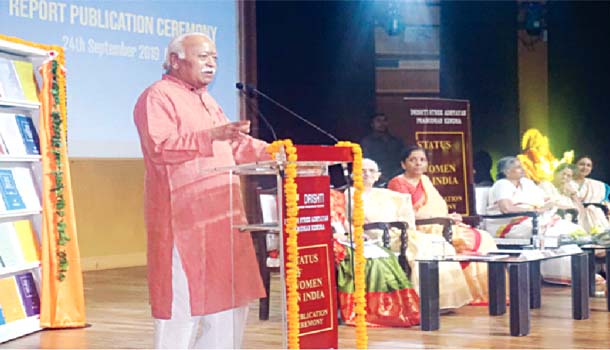
Shri Mohan Bhagwat speaking at the function after the release of the study report
The nationwide study by Drishti Stree Adhyayan Prabodhan Kendra Pune, Mumbai, on the status of women in Bharat released
New Delhi: “Women are capable of taking care of themselves and men should not think it is they who know better about how women can make progress. We need to just give them desired access, opportunities and freedom, they will make the path themselves,” said RSS Sarsanghachalak Shri Mohan Bhagwat, while releasing a nationwide study report on the status of women on September 24.
The report titled ‘Status of Women in Bharat’, has been prepared by Drishti Stree Adhyayan Prabodhan Kendra, Pune. Union Finance Minister Smt Nirmala Sitharaman, Pramukh Sanchalika of Rashtra Sevika Samiti Sushri Shantakka, president of Drishti Geetatai Gokhale, secretary Dr Anjali Deshpande and project director Dr Manisha Kotekar also shared the dais. RSS Sarkaryavah Shri Bhaiyaji Joshi, veteran Pracharak Shri Madan Das, Sahsarkaryavah Dr Manmohan Vaidya, former Pramukh Sanchalika of Rashtra Sevika Samiti Sushri Pramilatai Medhe, ABVP organising secretary Shri Sunil Ambekar and BMS president Shri CK Sajji Narayanan were among the distinguished audience.
Describing the study as ‘landmark’, Shri Bhagwat said the change for women should begin from individual homes. Quoting Swami Vivekananda he said women need to be reminded of their strength and motivate them to come out from their houses for social cause. “Women are expert in multi-tasking. They can manage both house and other activities. In most of the families they are consulted but their opinion is hardly taken seriously. The fact is that the women upliftment is possible only through the women. This study has been conducted by women and men also need to study its findings seriously,” Shri Bhagwat added.
Smt Nirmala Sitharaman said women need access, opportunity and genuine participation. She stressed the need to take the findings of the study to the ground and influence the policymaking. She called upon the women to come out from the comfort zone and play an active role in society.
In the beginning, Dr Anjali Deshpande, while introducing the activities of Drishti, said the women’s study centre is working for more than two decades in researching and understanding the vital and important issues regarding the women’s status in the society. Formed in 1996, Drishti has also conducted research on the status of tribal domestic workers brought to cities from Jharkhand, Chhattisgarh etc., and also trafficking of girls. The report exposed how those girls were exploited by the placement agencies and others. Drishti also studied the status of women in Haryana where the girls are brought for marriage from different states. Now, the study is being conducted to know the socio-economic status of women in north-east. Reports of three states have already been submitted to the respective state governments and follow up action has begun. She said Drishti would continue the studies, as they help to know the gravity of the problems. “This widespread survey will be definitely beneficial to central and state governments as well as the voluntary organisations. In addition to education, health, employment and safety, the issues covered in the survey are multi-dimensional such as women in a family to women in politics, women in slums to women in border areas. We have authentic statistics and observations on women in Bharat,” said Dr Anjali Deshpande.
Dr Manisha Kotekar briefed the findings of the study. She said the study was conducted across all 29 states and five out of seven Union Territories making it one of the most comprehensive studies on women in Bharat in recent times.
Women above 18 years of age were the unit of analysis and total 43,255 women were interviewed. A separate study on similar lines was conducted on girls below 18 years of age group. 7,675 girls from 5 regions, 25 states, 2 union territories and 283 districts were interviewed. Under the survey, 26 separate studies were conducted in addition to the overall assessment of health, education and employment of women. The recommendations of the study suggest a lot of change in policy formulation and their implementations on the ground.














Comments